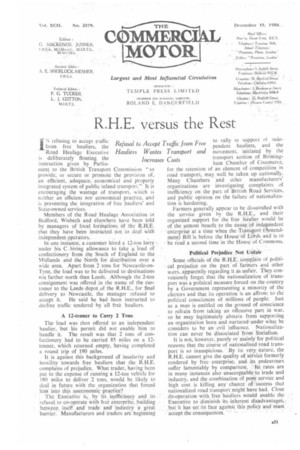R.H.E. versus the Rest I N refusing to accept traffic from
Page 33

If you've noticed an error in this article please click here to report it so we can fix it.
free hauliers, the Road Haulage Executive Hauliers Wastes is deliberately flouting the Increases instruction given by Parlia ment to the British Transport Commission " to provide, or secure or promote the provision of, an efficient, adequate, economical and properly integrated system of public inland transport." It is encouraging the wastage of transport, which is nzither an efficient nor economical practice, and is preventing the integration of free hauliers' and State-owned services.
Members of the Road •Haulage Association in Bedford, Wisbech and elsewhere have been told by managers of local forinatiOns of the R.H.E. that they have been instructed: not :to: deal with independent operators. ... • • In one instance, a•customer hired a I..2-tOn lorry • under his C hiring allowance to take a_load of confectionery from the South of England to the Midlands and the :North for distribution over a wide area. Apart from 2 tons for Newcastle-onTyne, the load was to be delivered to destinations not farther north than Leeds. Although the 2-ton consignment was offered in the name of the customer to the Leeds i depot .of the R.H.E., for final delivery to Newcastle, the manager refused to accept it. He said he had -been instructed to decline traffic tendered by all free hauliers.
Refusal to Accept 1
A 12-tonner to Carry 2 Tons The load was then offered to an independent haulier, but his permit did not enable him to handle it. The result was that 2 tons of confectionery had to be carried 85 miles on a 12tonner, which returned empty, having completed a round trip of 190 miles.
It is against this background df insularity and hostility towards free hauliers that the R.H.E. complains of prejudice. What trader, having been put to the expense of running a 12-ton vehicle for 190 miles to deliver 2 tons, would be likely to deal in future with the organization that forced him into this uneconomic practice?
The Executive' is, by its inefficiency arid its refusal. to co-operate with free enterprise, building between itself and trade and industry a great barrier. Manufacturers and traders aee beginning to rally in support of inde'raffic from Free pendent hauliers, and the Transport and movement, initiated by the Costs transport section of Birmingham Chamber of Commerce, • for the retention of an element of competition in road transport, may well be taken up nationally. Many Chambers and other manufacturers' organizations are investigating complaints of inefficiency on the part of British Road Services, and public opinion on the failure of nationalization is hardening.
Farmers generally appear to be dissatisfied with the service given by the RILE., and their organized support for the free haulier would be of the utmost benefit to the cause. if independent enterprise at a time when the •Transport.(ftmendrnent) Bill is before the House äf LOrds and is to be read.a second time in the House"of Commons.
Political Prejudice Not Unfair Some officials of the R.1-1.E..'coopla in of political prejudice on the part of-farmers and other users. apparently regarding it is unfair. They conveniently forget that the nationalization of transport was a political measure forced on the country by a Government representing a minority of the electors and that its operation is an affront to the political consciences of millions of people. Just as a man is entitled on the ground of conscience to refrain from taking an offensive part in war, so he may• legitimately abstain from supporting an organization born and nurtured-under what he considers to be an evil 'influence. Nationalization can never be dissociated frOm Socialism. It is not, however, purely or mainly 'for political reasons that the course of nationalized idad transport is so inauspicious. • By its very 'nature, the R.H.E. cannot give the quality of. service formerly rendered by free enterprise, and. its endeavours suffer lamentably by comparison. Its rates are in many instances also unacceptable to trade and industry, and the combination of poor service and high cost is killing any chance of 'success that nationalized road transport might have had. Close eV-operatiOn-with free haulierswould enable the Executive to diminish its inherent disadvantage's,: but it has Set it face against this policy and must accept the consequences. ••• • •




































































































